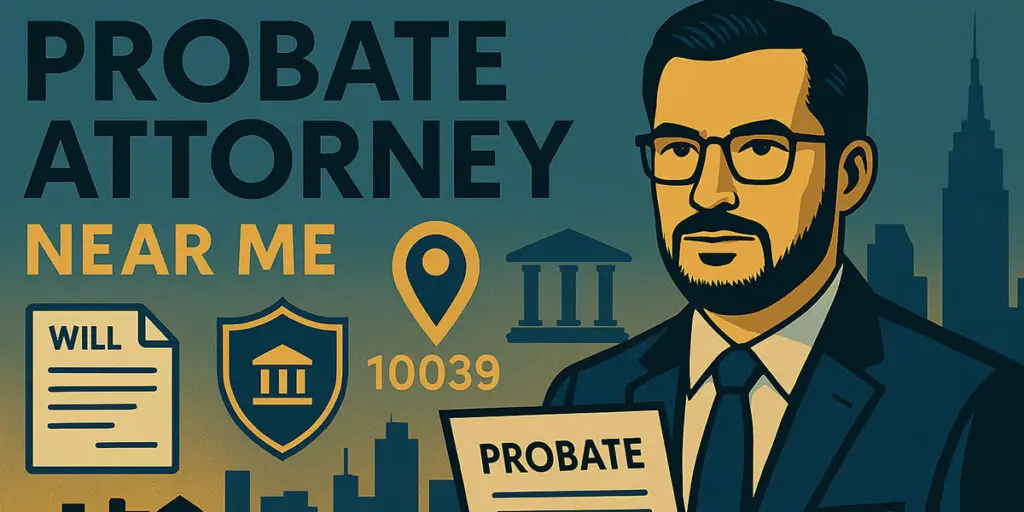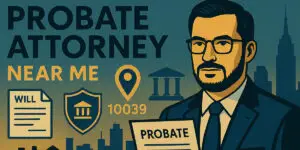Finding a Compassionate and Experienced Probate Attorney Near You in the 10039 ZIP Code: Navigating Estate Administration with Expertise
The loss of a loved one is a difficult time, and navigating the legal complexities of estate administration, also known as probate, can add to the stress and burden. If you are facing probate in New York City, specifically in the 10039 ZIP code (Harlem), finding a qualified “Probate attorney near me 10039” is essential to ensure the estate is properly administered and your rights are protected. A local attorney can guide you through the probate process, helping you understand your responsibilities and avoid potential pitfalls. At Morgan Legal Group, we provide compassionate and experienced legal services to individuals and families throughout New York City, guiding them through the probate process with expertise and care. This comprehensive guide explores the role of a probate attorney, the key steps in estate administration, and what to look for when choosing the right legal representation. Expert Guidance ensures everything goes smoothly.
What is Probate and Why Do You Need an Attorney?
Probate is the legal process of validating a will (if one exists) and administering the estate of a deceased person. This process involves:
- Filing the will with the Surrogate’s Court
- Notifying heirs and beneficiaries
- Inventorying and appraising assets
- Paying debts and taxes
- Distributing assets to the beneficiaries
Probate can be complex and time-consuming, particularly for large or complicated estates. An experienced probate attorney can help you navigate the process efficiently and effectively, minimizing stress and potential delays. While you may be able to do it alone, you risk many potential errors. Legal expertise is invaluable for navigating this process.
Key Responsibilities of a Probate Attorney
A probate attorney plays a crucial role in assisting the executor or administrator of an estate. Key responsibilities include:
- Guiding the executor or administrator through the probate process
- Preparing and filing all necessary court documents
- Representing the executor or administrator in court proceedings
- Communicating with heirs and beneficiaries
- Resolving disputes and conflicts
- Providing legal advice on estate-related matters
An attorney acts as a trusted advisor and advocate throughout the estate administration process. Their legal help is invaluable. Without this type of guidance, you may be left feeling lost and overwhelmed.
Why Choose a Local Probate Attorney in the 10039 Area?
While many attorneys offer probate services, there are distinct advantages to working with an attorney who is located near you in the 10039 area:
- Familiarity with the Harlem Community: A local attorney understands the specific needs and concerns of residents in Harlem.
- Proximity to the Surrogate’s Court: A local attorney is familiar with the New York County Surrogate’s Court and its procedures.
- Convenience: A local attorney is easily accessible for in-person meetings and consultations.
- Community Connection: A local attorney is invested in the community and committed to serving its residents.
Choosing a local attorney combines expertise with convenience and community connection. This allows for more convenient care.
What to Look for in a Probate Attorney: Experience, Compassion, and Communication
Choosing the right probate attorney is essential for a smooth and satisfactory experience. Look for an attorney who:
- Specializes in Probate and Estate Administration: Choose an attorney who focuses their practice on these areas of law.
- Has Experience in the New York County Surrogate’s Court: An attorney with experience in this court will be familiar with its procedures and requirements.
- Is Knowledgeable About New York Law: Choose an attorney who has a thorough understanding of New York estate law.
- Is Compassionate and Understanding: Look for an attorney who is sensitive to your needs and concerns during this difficult time.
- Has Strong Communication Skills: Choose an attorney who can explain complex legal issues in a way that you can understand.
Remember to seek an attorney who is compassionate and helpful to assist. It can also be a very stressful time. It’s important to be able to place your needs and feelings in someone else’s hands and know they will care.
Common Probate Issues and How an Attorney Can Help
The probate process can present a variety of challenges, such as:
- Will Contests: Disputes over the validity of a will.
- Creditor Claims: Claims filed by creditors against the estate.
- Asset Valuation: Determining the value of estate assets.
- Tax Issues: Paying estate taxes and filing tax returns.
- Family Disputes: Disagreements among heirs and beneficiaries.
An experienced probate attorney can help you navigate these challenges and protect your rights. These difficulties are best taken care of with an experienced legal professional. They can act as a neutral third party.
Fees and Costs Associated with Probate in New York
The cost of probate in New York can vary depending on the size and complexity of the estate. Costs typically include:
- Court Fees: Fees for filing documents with the Surrogate’s Court.
- Attorney Fees: Fees for the attorney’s services.
- Executor Commissions: Compensation for the executor’s time and effort.
- Appraisal Fees: Fees for appraising estate assets.
Attorney fees may be based on an hourly rate or a percentage of the estate value. Discuss fees upfront with any potential attorney. Transparency is essential for these matters. It is never a bad idea to ask for a clear break down.
The Importance of Acting Quickly: Time Limits in Probate
There are several time limits that must be met during the probate process. Failing to meet these deadlines can have serious consequences. For example, you must file the will with the Surrogate’s Court within a certain timeframe after the deceased person’s death. Creditors also have a limited amount of time to file claims against the estate. Timing is critical in the probate process.
An attorney can help you stay on track and meet all necessary deadlines. They can also make sure you keep up with the necessary information. Expert guidance can help prevent costly errors. It is best to find someone that is familiar with the courts in NYC.
What Happens If There Is No Will? (Intestacy)
If a person dies without a will in New York, they are considered to have died intestate. In this case, their assets will be distributed according to New York’s intestacy laws. The specific distribution will depend on the deceased person’s surviving relatives. New York law will determine what occurs.
The order of inheritance is defined by law:
- Spouse
- Children
- Parents
- Siblings
- Other relatives
If there are no surviving relatives, the assets will escheat to the state. An attorney can help to sort all of this out.
Can You Challenge a Will in Probate Court?
Yes, it is possible to challenge a will in probate court. However, there are specific grounds for challenging a will, such as:
- Lack of testamentary capacity (the testator was not of sound mind when they signed the will)
- Undue influence (the testator was coerced into signing the will)
- Fraud (the will was procured by fraud or misrepresentation)
- Improper execution (the will was not properly signed and witnessed)
Challenging a will can be a complex and contentious process. Legal counsel is essential for success. You need to understand your rights. It also depends on if you are to be appointed to the court.
Alternatives to Probate: Trusts and Other Strategies
Probate can be a lengthy and costly process, so many individuals seek to minimize or avoid probate altogether. There are several alternative estate planning strategies that can help you avoid probate, including:
- Revocable Living Trusts: Transferring your assets to a revocable living trust allows them to pass directly to your beneficiaries without going through probate.
- Joint Ownership: Owning property jointly with another person allows the surviving owner to automatically inherit the property upon your death.
- Beneficiary Designations: Naming beneficiaries on your retirement accounts, life insurance policies, and other assets allows them to pass directly to your beneficiaries without going through probate.
These alternatives can save time and money for your loved ones.
An attorney can advise you on these and other probate avoidance strategies, helping you create a plan that meets your specific needs and goals. These strategies can also be extremely helpful with tax burdens. Protect the resources for your family.
The Importance of Accurate Record-Keeping for Executors
As an executor, it’s crucial to keep accurate records of all transactions related to the estate. This includes:
- Bank statements
- Investment statements
- Receipts for expenses paid
- Tax returns
- Distribution records
These records will be needed to prepare the estate accounting, which must be filed with the court. Accurate records also help prevent disputes among beneficiaries.
Seeking Legal Guidance Throughout the Estate Administration Process
Whether you are an executor, a beneficiary, or another interested party in an estate, seeking legal guidance throughout the estate administration process can be invaluable. An attorney can provide:
- Objective advice on your rights and responsibilities
- Assistance with navigating complex legal issues
- Representation in court if needed
Having an attorney on your side can provide peace of mind and ensure that the estate is properly administered. Do not hesitate to ask for assistance. Legal advice can prevent costly mistakes.
Finding a Compassionate and Knowledgeable Probate Attorney Near You
Navigating the probate process can be emotionally challenging. It’s important to work with an attorney who is not only knowledgeable about the law but also compassionate and understanding. Look for an attorney who:
- Listens to your concerns
- Explains the process clearly
- Provides support and guidance
- Is responsive to your needs
The right attorney can make a difficult time a little easier. Do your research. You need to find someone you trust and respect. They are handling matters of sensitive information.
Morgan Legal Group: Your Trusted Partner in Estate Administration
At Morgan Legal Group, we understand the complexities of estate administration and are committed to providing compassionate and effective legal services to individuals and families throughout New York City and beyond. Our experienced attorneys can guide you through every step of the probate process, ensuring that the estate is properly administered and your rights are protected. Contact us today to schedule a consultation and learn more about how we can help you. View our Google My Business page to learn even more about Morgan Legal Group PLLC here. We hope that we can assist you in the near future.
Morgan Legal Group proudly serves the New York City community including the Bronx, Brooklyn, NYC, Queens, and Staten Island. If you are outside of New York City we also serve Long Island including Suffolk County. As well as Westchester, Ulster County, and Orange County.NY Courts









